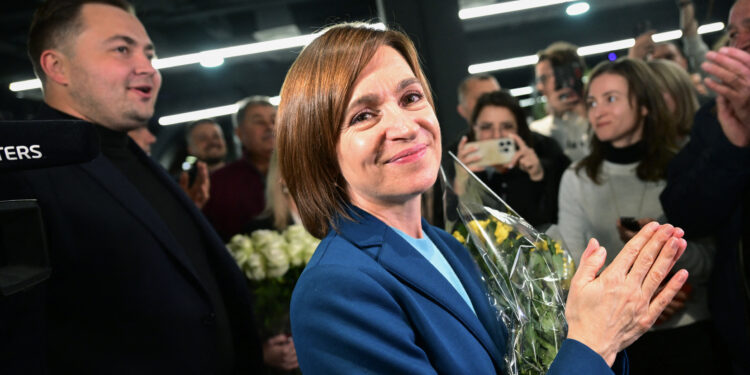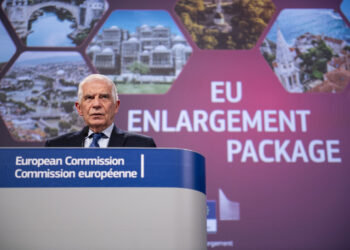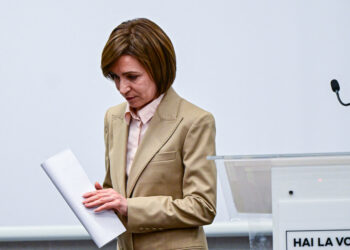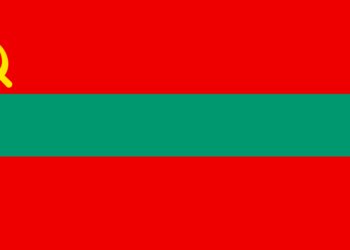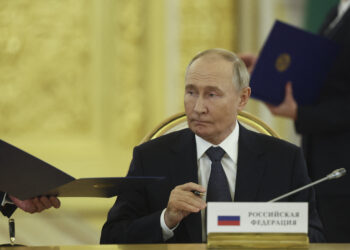Brussels – The outcome of the Moldovan presidential elections brings a sigh of relief to Western chancelleries with the confirmation of the outgoing head of state, pro-European Maia Sandu, for another four years. After the first round on October 20, voters rewarded the incumbent president of the Republic in the runoff, who wants to secure Chisinau’s path to the EU. According to authorities, the vote was tainted for the umpteenth time by interference from Moscow. What is certain, again, is that Sandu was “saved” by the diaspora, while at home, the pro-Russian challenger would have won.
The numbers of the challenge
With almost all ballots counted (99.86 percent of polling stations), the picture emerging from Moldova’s presidential election yesterday (Nov. 3) is clear: Outgoing President Maia Sandu won the second round with 55.41 percent of the vote, ahead of former pro-Russian Prosecutor General Alexandr Stoianoglo by more than ten points, standing still at 44.59 percent. “Moldova, today we’ve shown the strength of our unity, democracy, and commitment to a dignified future,” the head of state declared in response to the vote:
Moldova, today you are victorious. Together, we’ve shown the strength of our unity, democracy, and commitment to a dignified future.
Thank you, dear Moldovans, at home and abroad. Walk with pride—you are freedom, hope, and resilience. I am proud to serve you all. pic.twitter.com/yGGlrjAMEC
– Maia Sandu (@sandumaiamd) November 3, 2024
The aggregate data do not fully render the voting dynamics. For a better idea, it is necessary to consider the geographical origin of the consensus expressed. In the 1988 constituencies into which Moldova is divided, Stoianoglo overtook Sandu by more than two points (51.19 percent to 48.81 percent), while the incumbent president won the vote from abroad. With 228 out of 231 constituencies polled, Sandu took home 82.77 percent of the preferences of Moldovan expats, while Stoianoglo remained pinned at 17.23 percent. In the capital city of Chisinau, Sandu’s lead over her challenger was about fifteen points: 57.38 versus 42.62 percent.
Was there meddling?
Until the polls closed, the runoff was expected to be particularly hard-fought, and its outcome difficult to predict. Sandu, a former World Bank economist who ran as an area independent for the Action and Solidarity Party (PAS), the liberal and pro-European governing force, garnered 42.5 percent in the first round, while Stoianoglo stood at 26.5 percent. But the latter, backed by the pro-Russian Party of Socialists (PSRM), received the endorsement of several other defeated candidates on Oct. 20.
Another obstacle to Sandu’s reappointment, at least according to statements of the Moldovan authorities and the president, was another interference campaign orchestrated by Vladimir Putin‘s Russia, which allegedly targeted the Balkan country’s democratic process through fake news, disinformation, propaganda, and various forms of voter coercion, including the threat of attacks on polling stations abroad. The Secretary of State for Security, Stanislav Secrieru, denounced the forced transport of hundreds of Moldovan voters by the Russian side. Premier Dorin Recean said that several citizens received “anonymous death threats via phone calls.”
Sandu spoke of “unprecedented attacks” moved by “hostile forces outside the country” and accused the challenger (whom she dismissed from the post of attorney general last year) of being a Putinian “Trojan horse.” Stoianoglo counter-attacked by portraying himself as the man of dialogue with both the West and Russia and accusing the head of state of having “divisive” rhetoric in a country where, alongside the Romanian majority, lives a large Russian-speaking community.
The geopolitical game
The outcome of the vote is crucial for Moldova’s international positioning and could anticipate the dynamics that will characterize the next legislative elections in the first half of 2025. With the reappointment of the incumbent president for another four-year term, the small Balkan country would appear to have anchored itself more firmly in the Western camp. However, it is not yet certain that PAS (in power since 2021) will be able to retain control of the government next year.
Sandu said that membership to the European club would be the most important strategic task of Chisinau’s foreign policy and that she hopes to meet the target by the end of this decade. “Joining the European Union is the Marshall Plan of Moldova,” she said, referring to the monstrous investment plan with which the United States supported the reconstruction of Western Europe after World War II. Brussels recently adopted a funding package of nearly 2 billion euros to assist Chisinau on its path to the EU.
The alternative for the small Balkan republic is a return to the Kremlin’s orbit. Moldova is one of the states that make up the so-called post-Soviet space: a “belt” of countries that, according to many analysts, Putin would like to keep subjected to the Russian Federation to create a buffer zone against NATO, and which he tries to hold on to through more or less direct, military and hybrid interventions. In addition to interference in the Moldovan electoral processes, for decades, Moscow has kept troops in the separatist region of Transnistria, a patch of Moldovan land on the border with Ukraine.
Brussels Celebrates Sandu
It is why Brussels hailed Sandu’s victory with particular relief. “We congratulate the Moldovan authorities on a successful election, despite Russia’s unprecedented interference, including vote-buying schemes and disinformation,” the EU’s High Representative for Foreign Policy Josep Borrell said, denouncing the Kremlin’s “hybrid attempts” “to undermine the country’s democratic institutions and its path into the EU.”
On the same day as the first round of the presidential election, Moldovans were also asked in a referendum whether to introduce the goal of EU accession into the Constitution. Sandu had called the consultation, hoping for a decisive vote in favor. However, in the end, the European front won on a razor’s edge, again thanks to the vote of the diaspora and the capital. On that occasion as well, there were reports of significant interference from Moscow, facilitated by schemes of election fraud traced by investigators to pro-Russian oligarch Ilan Shor.
Moldova’s application for membership dates back to March 2022, and candidate status came last December. The first EU-Moldova intergovernmental conference was held in June of this year, formally kicking off negotiations for EU membership.
English version by the Translation Service of Withub